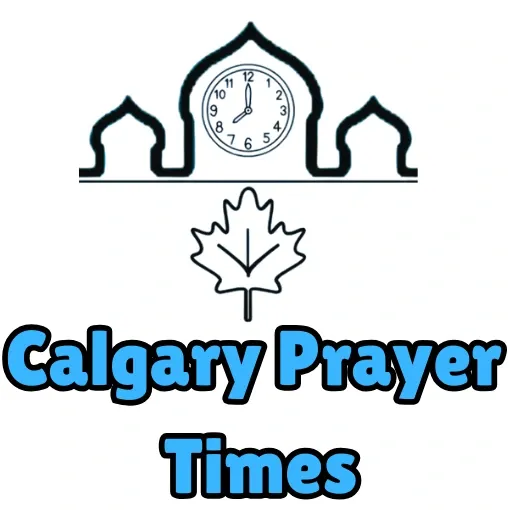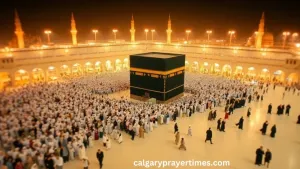The Hajj Safety Tips and Health Precautions Guide
The Hajj Safety Tips and Health Precautions Guide is necessary because Hajj, one of the Five Pillars of Islam, is a mandatory pilgrimage for every able-bodied Muslim who can afford it, typically taking place in the Islamic month of Dhul Hijjah. For 2025, it is expected to take place between June 4 and June 9, based on lunar calendar sightings, as confirmed by sources like Islamic Relief UK. This annual event sees 2-3 million pilgrims, making safety and health critical due to the scale and environmental challenges.
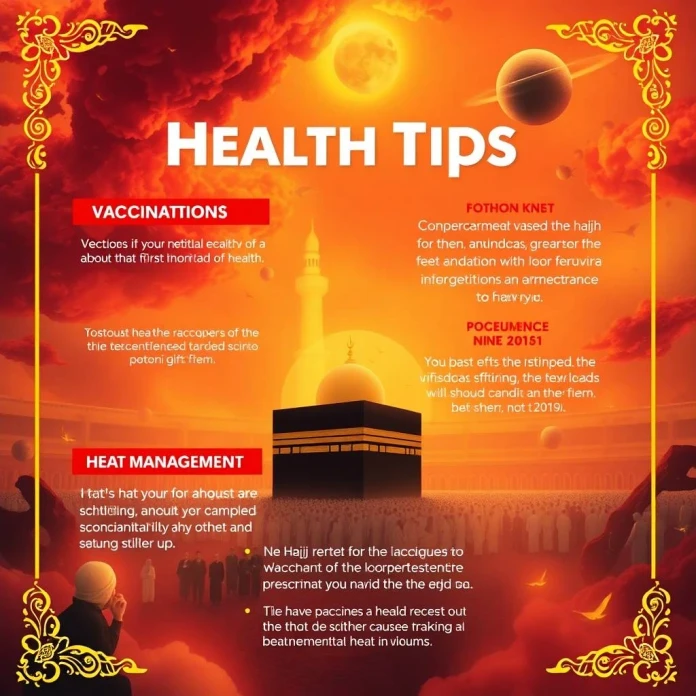
Detailed Safety Tips for Hajj
Safety during Hajj involves mitigating risks from fires, road accidents, crime, and crowd-related incidents. Here’s a breakdown:
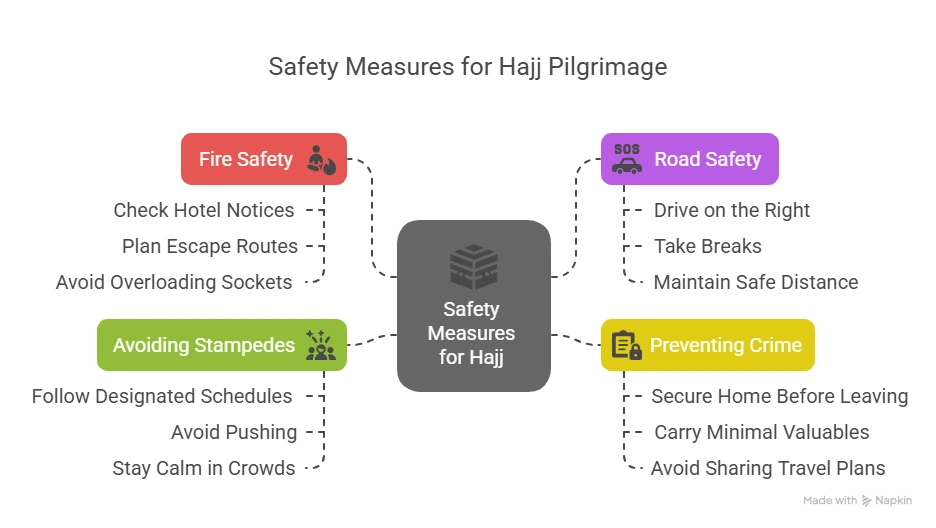
Fire Safety: Given past incidents, such as the 1997 fire causing 300 deaths, pilgrims must check fire safety notices in accommodations. Plan escape routes, keep exits clear, avoid overloading sockets, and never smoke in bed or leave cooking unattended.
Road Safety: In Saudi Arabia, drive on the right-hand side, observe road signs, and drive defensively. Take breaks on long drives to combat fatigue, and maintain a safe distance from vehicles ahead to prevent accidents, as noted in the same source.
Preventing Crime: Before leaving, secure your home by locking doors and windows, set alarms if available, and inform trusted contacts. Avoid sharing pilgrimage plans widely on social media to reduce burglary risks. Carry minimal valuables and keep them secure, as recommended by travel advisories.
Avoiding Stampedes and Crushes: With expected crowds of around one million, follow schedules by Mutawwif (guides), adhere to designated lanes for the Jamaarat Bridge, and avoid pushing. Proceed calmly, do not carry personal items, and avoid walking against traffic.
Comprehensive Health Precautions for Hajj

Health preparation is essential given the physical demands, heat, and potential for disease spread. Here’s a detailed look:
Vaccinations
- Mandatory Vaccinations: The Saudi Ministry of Health requires the meningococcal meningitis vaccine (ACWY), with polysaccharide valid for 3 years and conjugate for 5 years, administered at least 10 days before arrival, as per Nusuk Hajj Health Guidelines. Polio vaccination is required for those from polio-endemic regions, administered 4 weeks to 12 months before entry. Yellow fever vaccination is mandatory for travelers from prevalent regions and is valid 10 days post-vaccination for life.
We recommend influenza and COVID-19 vaccines, particularly for vulnerable groups. Pneumococcal vaccines are advised for adults over 65 or with chronic conditions, alongside routine vaccines like diphtheria, tetanus, polio, and MMR.
General Health Preparation
Improve mobility and fitness 4–6 weeks before traveling to handle long walks. Get a general health check-up, manage chronic conditions, and ensure routine dental and eye check-ups are complete. Carry enough medication, including extras for delays, and discuss delaying periods with hormonal medication if needed.
During Travel: Managing Risks
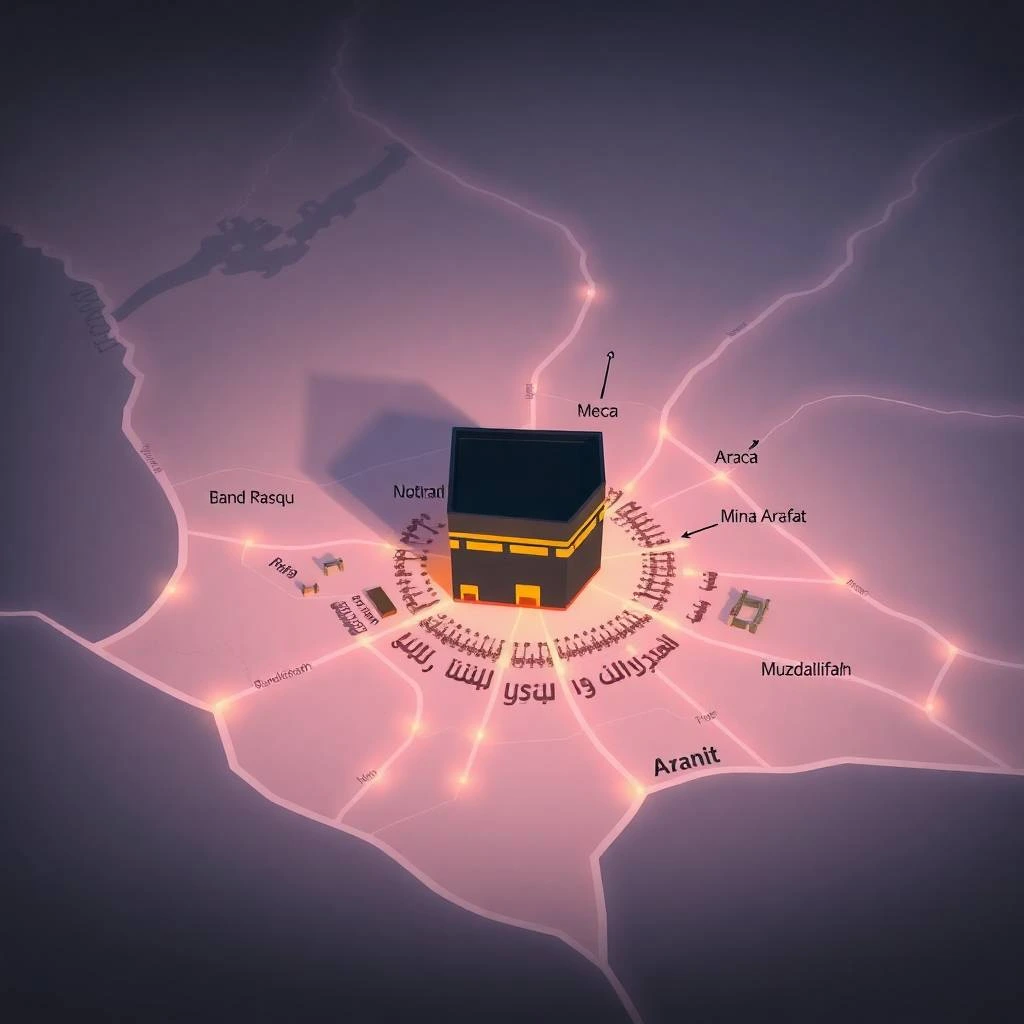
- Heat Management: Temperatures can exceed 45°C in summer. Stay hydrated, wear light, loose-fitting clothing, use SPF 30+ sunscreen, and rest in shaded areas. Use umbrellas for additional shade.
- Respiratory Protection: Wear masks in crowds to prevent influenza, COVID-19, and MERS-CoV spread. Practice hand hygiene, avoid contact with sick individuals, and seek medical help early for symptoms.
- Food and Water Safety: Wash hands frequently, eat well-cooked meals, and drink bottled or sterilized water to avoid travelers’ diarrhea, hepatitis A, and typhoid, as recommended in the same source.
- Foot Care: Wear comfortable shoes, wash and dry feet daily, and check for blisters to prevent infections, especially for those with diabetes.
- Insect-Borne Diseases: Protect against mosquito bites to prevent dengue, malaria, and leishmaniasis, using repellents and covering skin.
First Aid Kit Essentials
Pack a comprehensive first aid kit including:
- Medications for cold, fever, pain, allergies, and digestive issues
- Antiseptics, bandages, and personal hygiene items like sanitizers
- The kit includes a thermometer, blood pressure monitor, and glucometer for the management of chronic conditions.
Frequently Asked Questions (FAQs) with Detailed Answers
To address common concerns, here are detailed responses:
Conclusion and Final Thoughts
Hajj 2025 offers a profound spiritual opportunity, but preparation is key to ensuring safety and health. By following these guidelines, pilgrims can mitigate risks, manage health challenges, and focus on the spiritual aspects of the journey. Always consult official sources like Nusuk Hajj for the latest updates and package details.
